With the Olympic Games in full swing, the seaside city of Sochi has grown accustomed to being the center of international attention—a decent part of which goes to the city’s LGBTQ community, whose existence was recently challenged by Sochi’s mayor. In local LGBTQ circles, opinions on the subtext of the mayor’s words diverge, as do attitudes toward Russia’s gay rights politics. But understood together, the differing views of those who dare to take a stand in front of the foreign media tell a complex story of a clash between the state and private desire.
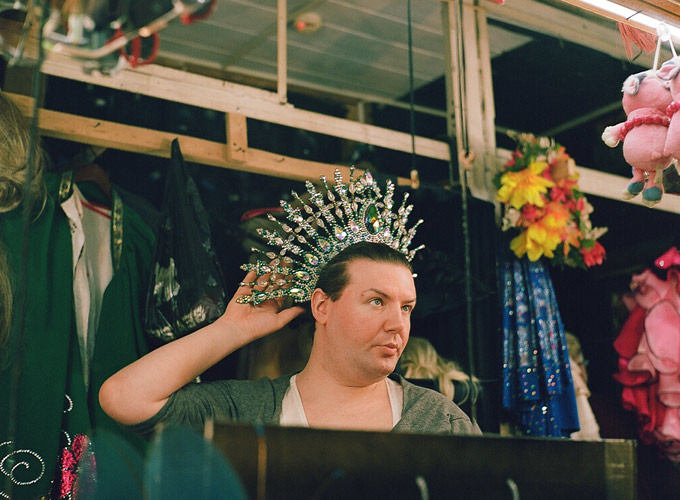
Sergey, also known as the drag queen Isidora Vulkan, or simply Asya, prepares for a show in Sochi’s Club Mayak. The crown is fitting; she is truly queen of Mayak, where everyone adores her.
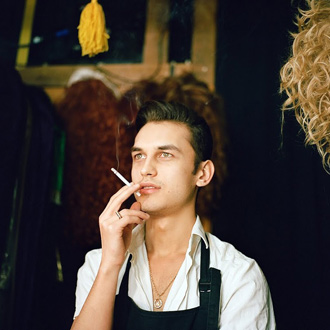
Albert, a waiter, smokes in Club Mayak’s dressing room.
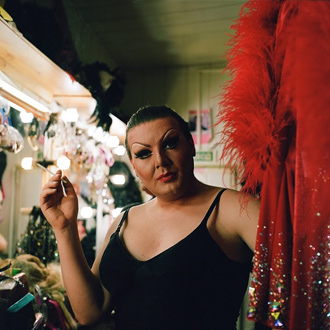
Asya prepares for her birthday show in Club Mayak’s dressing room.
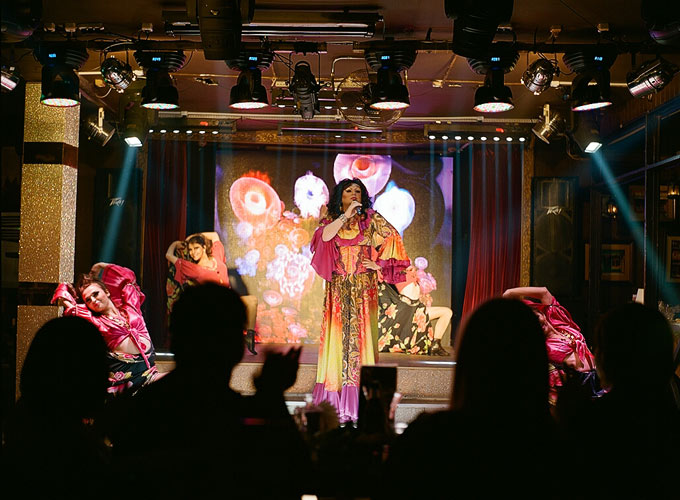
Asya singing Ukrainian songs at Club Mayak. Mayak does not exclusively attract gay visitors. Straight guests also commonly frequent the club, which has actually become more popular in the wake of the government’s attempts to close it ahead of the Olympics.
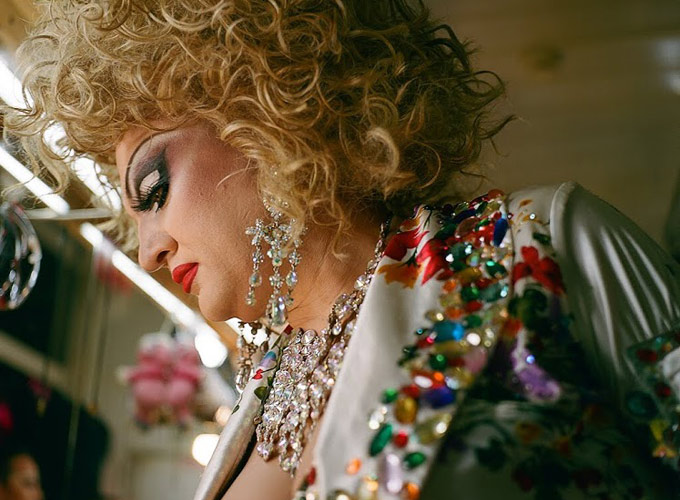
For some Russians the “anti-gay law” is a decoy to boost the morale of an embattled nation. Standing up for one’s sexual identity, among those who share this view, entails becoming a political activist at a much broader level. Vlad, 17, told me, “I just can’t keep silent when this drastic law is being used to distract attention from the real problems, like corruption or how the government has been discriminating against Sochi citizens, relocating them from their private homes to tiny apartments to make sure they don’t get in the way of the festivities.” Vlad, who lives in Sochi, has been trying to use his public persona for political activism ever since he was outed by his classmates at 15. A strong believer in the “it gets better” principle, Vlad maintains that humanizing homosexuality is crucial, even if it means that he has to suffer through neo-Nazi attacks and the bigoted attitudes of policemen, teachers and social workers—the same people who are supposed to protect harassed teenagers like him.
“The biggest issue is that nobody here knows what homosexuality really means, as they keep comparing it to child molestation,” says Marat, an art director who works for a chain of gay clubs in Krasnodar, a city in the same southern region as Sochi. Marat is an eager participant in gay pride parades whenever he travels abroad but prefers to keep his identity hidden back home. He recalls that before the “gay propaganda” law was imposed Krasnodar appeared to be more tolerant and accepting. With all the attention that has come Sochi’s way, he says, discrimination against a relatively under-the-radar community in this region has been on the rise.
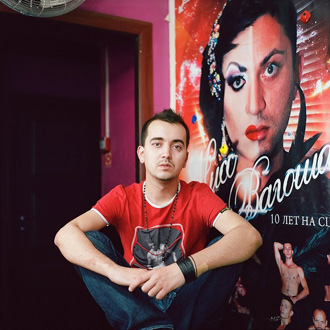
Marat, art director of the Central Base Club in Krasnodar, Russia. His work for a few gay clubs in Krasnodar has made him famous in the city, located 300km northwest of Sochi.
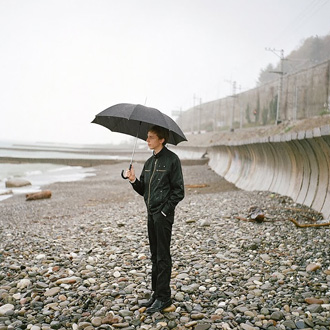
Vlad, a 17-year-old student, stands on a nudist beach in Sochi where anti-gay graffiti can be seen.
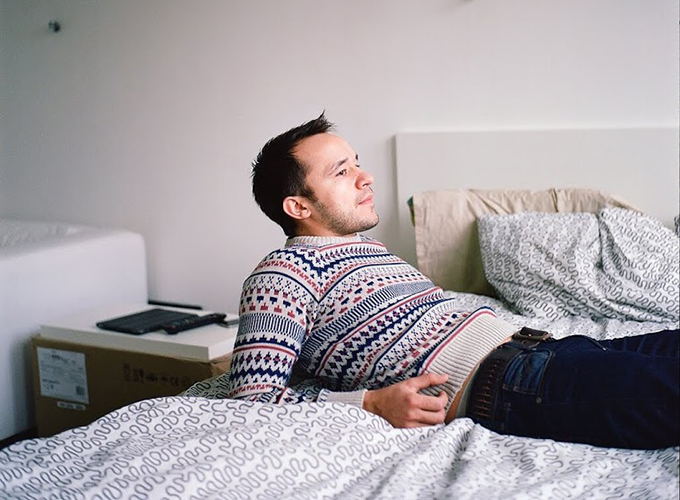
Anton, who works at a hotel bar, in his new apartment in Sochi.
Olga, a student in Sochi, is proud to show her face beside a rainbow flag on social networks but does not want her parents or any locals to learn about her sexual identity. “My parents are bent on finding me a boyfriend, which is annoying,” she told me. “But still, even if they do find out, I know they’ll be able to understand. Society—not as much. Russia is not ready to accept homosexuality.”
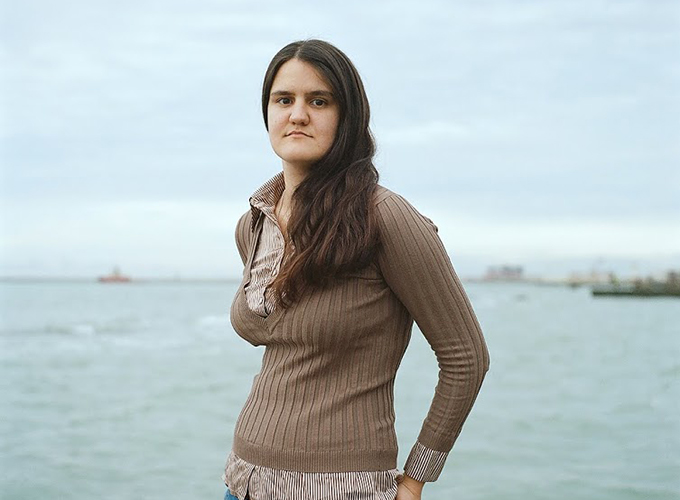
Olga, a student, at the beach in Sochi. She keeps her sexual orientation a secret within her family, though not on social networks. She is afraid her parents will stop paying for her education if they know the truth.
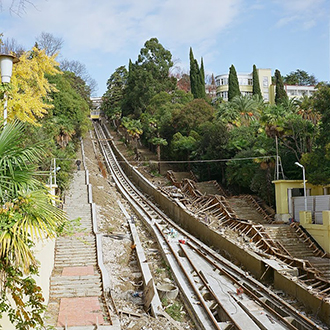
An old tramway track under construction in Sochi. Now everything has to be new.
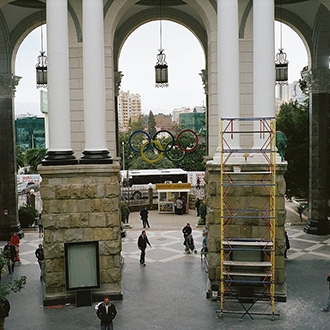
Sochi’s train station, in Stalin’s imperialist style, looks good with Olympic rings.
Isadora Vulcan—a drag queen who works for Mayak, a gay club in Sochi, and goes by the name Asya—appreciates the modernized amenities that the Olympics have brought to her city. She is not so upset by the “gay propaganda” law. Placing emphasis on independence, she feels that she can live a fulfilling life by closely interacting only with her community and its allies and concentrating on work. “Being proud of one’s homosexuality doesn’t make sense to me. I’m proud of my artistic success, but as a spiritual person, more often I’m just thankful.” For Asya, following the example of gay rights struggles in the West is not the right approach; Russia’s LGBTQ community needs to find its own identity, in accordance with the country’s cultural background and local moral principles.
How that is even possible, given that the government virulently opposes homosexuality to traditional lifestyles, remains an open question. Reflecting on the aftermath of the Olympic Games, Asya predicts, “When the fascination with Sochi fades, the main issue will be to adjust the locals’ mentality to all the upscale, high-tech renovations we now have here.” The question is, will the modern scenery be accompanied by more progressive attitudes, and can the LGBTQ community capitalize on the increased attention that it has received in its push for equality?
For now, Russia’s LGBTQ community is a truly diverse demographic whose members are united only by the fact that they all live at the margins of society. But even if their voices are not always in sync and their personal agendas differ from the traditionally Western “out and proud” principle, they all want to show the true face of gay Russia—one that is beautiful, compelling, distinctive and human.
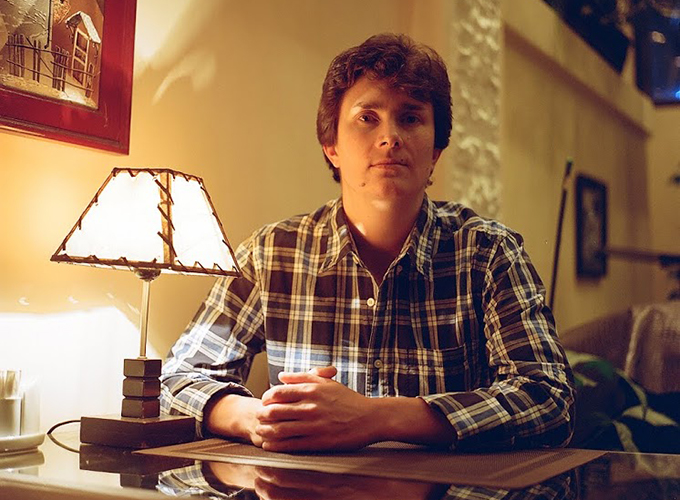
Diana is a DJ in Mayak club. She is ironic about the political situation in Russia, which is marked by many grave injustices that are receiving less international attention: “If the gay propaganda law is the first and main problem of Russia, I feel good.”
All photos copyright Olya Ivanova, December 2013. These photos were originally commissioned by the German magazine NEON.
This piece was made possible, in part, thanks to the generous support of the Trust for Mutual Understanding.

